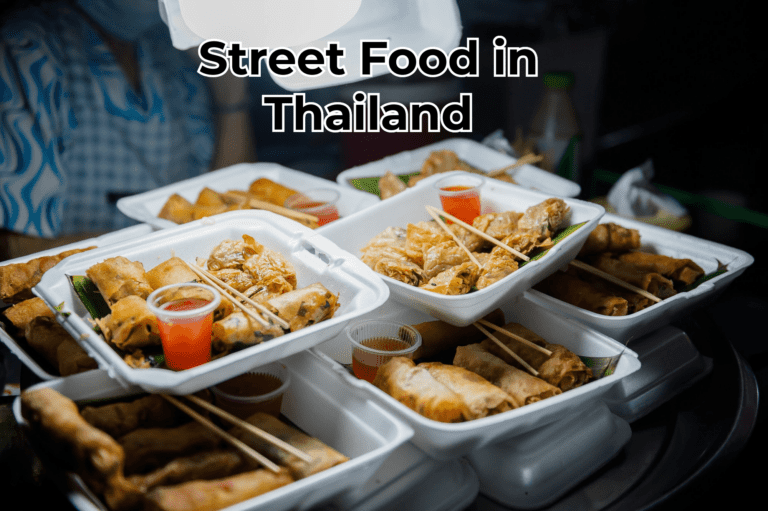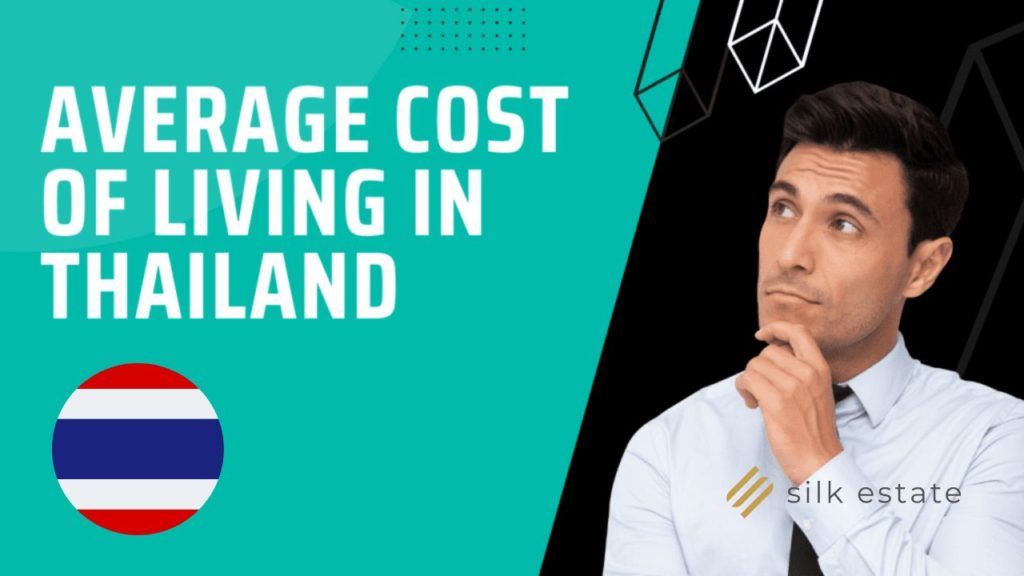Thailand is a popular destination for travellers, expats, students, and professionals from around the world. From its stunning beaches to its delicious food and friendly locals, there’s something for everyone in Thailand.
If you’re planning on relocating to Thailand, you may be asking yourself about the average cost of living in cities like Bangkok. While Thailand is an affordable place to live, it is important to consider the cost of the necessities like housing, utilities, food, and transportation when planning and budgeting for a move to Thailand.
In this blog post, we’ll explore the average cost of living in Thailand in 2024 to help you plan for your move to this amazing destination.
Comparing the Cost of Living in Thailand to Western Countries

When comparing the cost of living in Thailand to that of Western countries, it’s important to keep in mind that there are a number of factors that can impact the overall cost of living, including the specific location within Thailand or the Western country, the cost of housing and other necessities, and personal lifestyle choices.
Generally speaking, the cost of living in Thailand is lower than in many Western countries, especially when it comes to necessities like housing and food. For example, the average cost of rent in Thailand is lower than in countries like the United States, Canada, and Australia, while the cost of groceries and dining out is also generally lower.
However, there are also some areas where the cost of living in Thailand may be higher than in Western countries, such as the cost of imported goods and luxury items. Additionally, the cost of healthcare and insurance may be higher in Thailand than in some Western countries.
Overall, the cost of living in Thailand can vary widely depending on your location, lifestyle, and personal preferences, so it’s important to carefully consider your budget and what you’re willing to spend when comparing the cost of living in Thailand to that of Western countries.
Regional Variations in the Cost of Living in Thailand
There can be significant regional variations in the cost of living in Thailand. For example, the cost of living in cities like Bangkok and Chiang Mai is generally higher than in smaller cities or rural areas, due to factors such as higher demand for housing and other necessities.
Additionally, certain regions of Thailand may be more expensive due to their proximity to tourist attractions or other factors that drive up the cost of living. For example, beach towns and resorts may have higher costs due to the demand for vacation rentals and tourist amenities.
Overall, it’s important to consider the specific location and regional factors when evaluating the cost of living in Thailand, as these can have a significant impact on your budget and lifestyle.
Cost Of A House In Thailand
If you would like to invest in real estate in the Land of Smiles, here’s a short breakdown of what you need to know about the cost of a house in Thailand.
How much should you expect to pay for a house in Thailand? For quality real estate, starting prices range from $100,000 to $140,000. This can get you a decent 45 sq. meter furnished apartment in the city. If you are looking to buy a villa in Thailand and you are looking for something grander, then starting price for that luxury is around $200,000. You can often get an interest-free instalment plan from developers, and early birds can score a discount of up to 40%. So make sure to get in touch with us about that.
The Cost of Rent and Amenities In Thailand
If you’re planning to rent a home in Thailand, you can expect to pay between $330 and $550 per month for a 30 sq meter studio room in Bangkok. In more upscale areas like Silom, you might pay anywhere from $650 to $800 for a similar-sized studio.
In cities like Samut Prakan, it’s common to find independent houses that can be rented for as little as $450 per month. These houses often have around 80 sq meters of space and may include a backyard and porch. However, in Bangkok, a similar house would likely cost at least $800 per month. It’s worth noting that it’s possible to negotiate for a lower rent in many cases in Thailand, and some renters have been able to secure a reduction of up to 40% with the right negotiation strategy.
If you prefer to rent a single room in a managed property service like Airbnb, you might pay a higher amount (between 20-50%) for the same size room, but the rent will typically include maintenance and other basic amenities.
Read: Compare the difference between booking an Airbnb and renting in Bangkok.
Keep in mind that if you’re a foreigner renting a place in your own name, most landlords will ask for a refundable deposit equal to two month’s rent and the first month’s rent in advance. In some cases, landlords in cities like Bangkok may also ask for an additional month’s rent as a security deposit, but this is not always the norm. In cities like Chiang Mai, where rental costs are lower, the security deposit may also be proportionately lower.
Alternatively, you may choose to lease a house in Thailand. In this case, you’ll likely pay a fixed amount for the lease for a certain duration, with additional fees for amenities on a per-month basis. The cost of leasing a house will depend on factors like the size of the house (in sq meters), the term and tenure of the lease, and any plans for building or renovations. The terms of the lease will be agreed upon by the lessor and tenant.
Read: Top residential area where most people live when they move to Thailand.
Having lived in Thailand for a while, I cannot deny, it is an amazing place to live. The food is delicious, the people are friendly, it’s exciting with plenty to do and the cost of living is relatively low compared to many Western countries. That being said, it’s still important to budget carefully and understand the average costs of living in Thailand in 2024.
The Cost of Electricity and Water in Thailand
“Having a constant supply of electricity and water is essential in Bangkok, although some cities in Thailand may experience occasional power cuts. The cost of these utilities can vary widely depending on the size and location of your home. For example, a one-room studio apartment might pay around $40 per month for electricity and water, while a four-bedroom villa might pay as much as $300 per month. These estimates assume that you’re using the air conditioning unit while you sleep and conserving energy by turning off lights, fans, and ACs when you’re not home.
The cost of water is generally lower than electricity, with an average cost of $4 per month for a one-room studio apartment and $25 per month for a four-bedroom villa. Of course, these costs will depend on your usage and any wastage. It’s worth noting that many condo developers in Thailand offer units with rainwater harvesting systems, which can be a complimentary amenity for residents.
The Cost of Food, Coffee, and Alcohol in Thailand

There’s no limit to how much you can spend on food and alcohol when you go out to pubs and nightclubs in Thailand. On a budget, you might expect to spend around $100 for a night out, but this will only go so far. Alcohol isn’t particularly expensive in Thailand, but many upper-class establishments charge premium prices for top-shelf brands and the ambiance of the venue. It’s worth noting that additional taxes are often levied on food, alcohol, coffee, and other consumables.
If you’re looking to save money on food, street food and local restaurants can be a good option. A filling meal from one of these venues might cost as little as $2. Alternatively, you might pay anywhere from $4 to $10 per meal at a smaller chain restaurant. A full course meal at a fancy sushi restaurant could cost around $20 per person.
Coffee is also a popular drink in Thailand, with an estimated consumption of 30 million Thai baht per year. However, the majority of this revenue comes from instant coffee and three-in-one packs that can be easily made at home. If you’re a fan of coffee (like me!), you have a few options for better-tasting coffee. If you prefer to go out for coffee, you might pay around $4 per cup at chain establishments like Starbucks, or $2 at a local coffee shop with WiFi and charging facilities. Alternatively, you can buy a coffee maker in Thailand for as little as $50 to $300, with coffee packets costing around $10 – 30 per month. Of course, you can also find more expensive coffee makers and gourmet instant coffee powders if you prefer.
The cost of food and drink in Thailand can vary widely depending on your preferences and lifestyle. If you’re looking to save money, street food and local restaurants can be a good options, while more upscale establishments will naturally cost more. The same is true for coffee, with instant coffee and home brewing being the most budget-friendly options, while going out for coffee or purchasing high-end equipment and products will cost more. Overall, it’s important to budget carefully and consider your personal preferences when planning your food and drink expenses in Thailand.
The Cost of Transportation in Thailand
One of the main benefits of living in a city like Bangkok is the convenient and affordable public transportation system. The underground MRT and BTS Skytrain both offer connectivity to every corner of the city, though there are many options you can take and generally transportation in Thailand is generally affordable and convenient, with a range of options to suit your needs and budget.
BTS Skytrain:
This elevated train system connects many parts of the city and is a popular choice for tourists and locals alike. The fare ranges from 15-65 baht (about $0.50-$2.10) depending on the distance traveled.
Learn more about the BTS Skytrain in Bangkok
MRT Underground:
This subway system serves many areas of the city and is a convenient way to get around. The fare ranges from 16-40 baht (about $0.50-$1.30) depending on the distance traveled.
Bus:
The Bangkok Mass Transit Authority (BMTA) operates a comprehensive bus network throughout the city. Fares range from 6-40 baht (about $0.20-$1.30) depending on the distance traveled and the type of bus.
Taxis:
Metered taxis are readily available throughout the city and can be hailed on the street or booked in advance through a ride-hailing app. Fares start at 35 baht (about $1.15) for the first 2 kilometers and increase by about 5 baht (about $0.15) per kilometer thereafter.
Tuk-tuks:
These small, three-wheeled vehicles are a popular choice for short trips and offer a more unique transportation experience. Prices can vary widely from can cost anywhere from $5 to $50 depending on the distance traveled and the negotiation skills of the passenger.
Other Factors That Affect the Average Cost of Living in Thailand
There are various other factors that can contribute to the overall cost of living in Thailand, including transportation, insurance, phone plans, and the cost of buying or leasing property.
Here are 7 contributing factors to cost in Thailand:
Insurance costs in Thailand:
One factor to consider when budgeting for the average cost of living in Thailand is the cost of insurance. Many expats living in Thailand as students, working professionals, or retirees choose to purchase health and life insurance to provide peace of mind while living in a foreign country. There are several reputable insurance companies that offer policies for expats, with premiums starting as low as $10 per month for young adults without any pre-existing health conditions or driving experience.
Keep in mind that the cost of insurance in Thailand will vary depending on your personal circumstances and the level of coverage you choose. It’s important to do your research and compare policies from different companies to find the best fit for your needs and budget.
Phone plan costs in Thailand:
Another factor to consider when calculating the average cost of living in Thailand is the cost of phone and data plans. If you’re planning to stay connected while in Thailand, you have a few options to choose from. Basic phone plans with limited calling and data start at around $10 per month, with the option to add more as needed. If you need more data and calling time, you can find unlimited mobile plans starting at around $30 per month.
If you prefer to have a home Wi-Fi connection, you can find a router and plan for as little as $20 per month, which includes 200 Mbps speeds and a 100 GB data limit. As with any phone or data plan, it’s important to consider your personal usage and needs when selecting a package to ensure you get the best value for your money.
Thai Insurance costs:
Gym, sauna and spa memberships for basic amities in most gyms start at $35 a month. If you wish for a personal trainer during your workouts then the add-on cost for this would be $20 to $30 per session. Muay Thai Gyms offer complete packages that cost $200 a month and there is a myriad of these gyms in Thailand that offer step-by-step classes for beginners. Note that many condo complexes offer built-in gyms to their members at no additional cost and these gyms are usually fully equipped and have an attached sauna as well.
Health care:
If you’re planning on living in Thailand long-term, you’ll want to make sure you have access to reliable and affordable health care. While some expats opt to pay out-of-pocket for private medical treatment, others choose to purchase health insurance to cover their medical costs.
Entertainment:
Thailand is known for its vibrant nightlife, with a wide range of options for entertainment ranging from live music to cultural festivals. Of course, these activities can add up, so it’s important to budget accordingly.
Education:
If you have children, you’ll need to consider the cost of education in Thailand. While private schools can be expensive, there are also many reputable public schools that offer a good education at a lower cost.
Miscellaneous expenses:
There are always unexpected expenses that come up when living in a new place, so it’s important to save some extra money for these contingencies.
Overall, the average cost of living in Thailand will depend on your personal circumstances and preferences. By carefully considering all of these factors and budgeting accordingly, you can make the most of your time in this amazing country.”
To summarize the cost of living in Thailand
The cost of living in Thailand will depend on your desired lifestyle and personal preferences. If you’re looking to live frugally, it is possible to enjoy a fun and fulfilling lifestyle for around $1500 per month. However, if you want to eat at top restaurants and live in luxury properties, you should budget closer to $5000 per month.
It’s important to keep in mind that these estimates are general and may vary based on your location and specific lifestyle choices. However, with careful planning and budgeting, it is possible to live an affordable and enjoyable life in Thailand no matter what your budget may be.
Investing in Property in Thailand: Tips and Assistance
If you’re interested in investing in property in Thailand, you may be eligible for a mortgage with a Thai bank, with loan terms of up to 30 years. It’s important to work with reliable real estate agents like Silk Estate to find the best property options and ensure a smooth process.
Silk Estate can assist you in purchasing luxury Thai property and also offer managed property services if you plan to rent out your property while living overseas.
Contact us to learn more about how we can help you navigate the process of purchasing and managing property in Thailand as a foreign property investor, and add value to your property purchase while minimizing the stress of being a foreign real estate investor in Thailand.
Ready to buy a property in Thailand?
Contact Silk Estate today to start your search for the perfect condo.
You may be interested in this post >>> Things To Keep In Mind While You Buy A Condo in Bangkok.
You may also be interested in this post >>>Top 10 Reasons To Become An Expat and Move To Thailand In 2023




